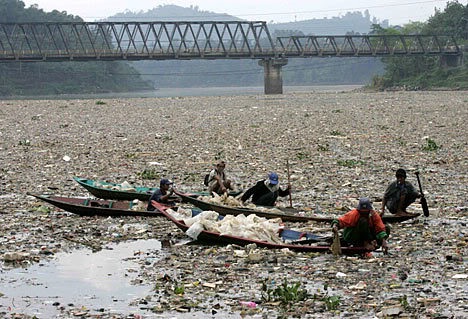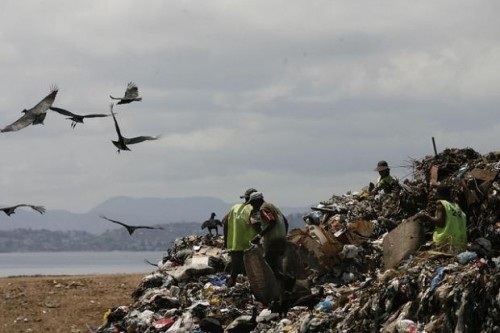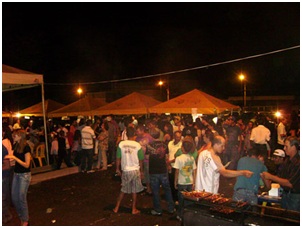Reverse Logistics: It is in giving that we receive!

The title is nothing original and reverse logistics is an old principle. There will always be those who remember the times when we had to bring the empty bottles back to the store in order to buy milk, beer or soda pop. Reverse logistics is the area of logistics that works generally with the physical flow of products, packaging and other materials, conversely from the point of final consumption to its place of origin.
The purpose of Federal Law 12.305, which is regulating this issue in Brazil, is to make accessible and practical the return of materials which are insensibly and relentless dumped across the country, as is all over the world, and for them to be recycled and reused, thus avoiding the production of waste and pollution.
The principle logic is for the producer to be responsible for the recycling of their own packaging. Those responsible for the spreading of packages and products all over, if necessary would be obligated to collect the remains. This would surely incline them to produce more easily recyclable packaging.
The large companies have improved ways of transporting their products to all corners of the world from its manufacturing plants and distribution points. And they use a modern concept to label this complex process: OPERATIONAL LOGISTICS.
Today it is certain that in remote places like the Iuaretê Indian Reservation, Amazonia, in Taoudeni, Sahara Desert, Sunzhenskiy, Caucasus, or on the banks of the Citarum River, on the island of Java, near Jakarta the Indonesia’s capital, pictured above, or in any country dusty roadside bar you can grab one of these “universal” soft drinks of your choice, or buy a radio battery and discard the empty package or the product on the spot, contaminating the environment .
The large distributors put their containers of plastic, glass, metal or paper mix and other materials on the market, and that because they are non-returnable makes it possible for them to charge a miniscule price. They do not spend a penny on the collection of bottles, containers, or cartons.
The poor Indian, Bedouin, peasant and boatman naively and without alternatives to quench their thirst and even to stave off hunger, are obliged to receive packages and wastes that will spend years collecting mosquito larvae, dirt and rot in otherwise crystal clear and healthy lands and water springs.
All this seems to be the present state of affairs anyway. So what to do? Some of the more simple-minded say that this is progress. The residues left by the consumption of liquids and solids so carefully brought by delivery trucks stain and putrefy the world. The voracious capitalist does not feel pity, and in the future … we will all be dead! For the managers of these multinational companies the only thing that matters is the financial result, the immediate profit. A single packaging and wrapper company for one of these cough syrup companies is worth, for the brand name alone, $50 billion!
For decades now, the Brazilian government has spent a lot of money to clean a small portion of these residues and, more recently, to raise awareness and involve the public in a new attitude and behavior called “selective collection.” The government also applies resources to identify and support millions of people who live off of the work of collecting even a small amount of recyclable materials, but their gains are negligible and does not allow for a minimally decent life. They are usually homeless people in big cities, or people who live in shacks in surrounding small towns. These workers gradually come together to collect, screen and market the recyclable materials at the prices imposed upon by the competitive market.
Today much of the population is already aware that recyclable materials should be returned to the productive chain. But it is also known how expensive, cumbersome and complex it is to run this return system.
Millions of garbage collectors from large centers are organized at great expense and effort by cooperatives and associations to collect and / or just take what they can sort out of the huge amount of discarded materials. Municipalities are currently investing considerable sums on this special collection project. Some large cities like Belo Horizonte, put trucks – once a week – door to door for the collection of recyclable materials. Most are PET bottles, the acronym for polyethylene terephthalate, general plastics, paper and glass. The practice and the resulting legislation claim that manufacturers and intermediaries of such products must assume the costs of collecting all such recyclable materials from around the planet.
The Planning Department of the Municipality of Belo Horizonte has signed an agreement with its suppliers of fluorescent light bulbs for them to collect all burnt out light bulbs. Sounds simple, right? The only thing left is for the public authority branches and large companies to abide by this agreement and for the light bulb issue, being one of the most serious problems, to be resolved.
Much simpler than elaborating complex strategic, tactical and operational planning, is to take advantage of this simple idea for collecting these materials every week and handing them over to the “collectors”, so that after the recyclables are taken in and baled, can receive a decent pay for this service.
Some companies, that have until recently denied their responsibilities, have anticipated the obligation to collect their packages and to support workers who collect recyclables. And they do it with such fanfare in the media that it creates a spontaneous marketing scheme that’s very cheap and efficient considering the billions they invest in advertising campaigns. As is the case of the Coca Cola workers in partnership with their cooperative Gramacho Collectors, Duque de Caxias, pictured below, in Rio de Janeiro, published extensively in the media.
Specific initiatives indicate that this may be the easiest way: financially support or engage the services of existing cooperatives to collect everything that is spread around the world by major producers, packers and distributors.
As cooperativas de catadores e triadores organizam-se cada dia melhor. Agora chegou a hora das grandes empresas integrarem-se ao sistema, financiar a coleta e ampliar as formas e procedimentos de realizar o caminho de volta dos materiais: a LOGISTICA REVERSA.
Cooperatives of trash collecting and scrap collectors become better organized every day. Now is the time for the big companies to integrate into this system, to finance collection and expand the ways and procedures to establish the way back for these materials: REVERSE LOGISTICS.
And the companies that get ahead of the game may make even more money from increased sales and winning the sympathy of the population. In the words of St. Francis of Assisi: “For it is in giving that you shall receive!”
Related Articles













